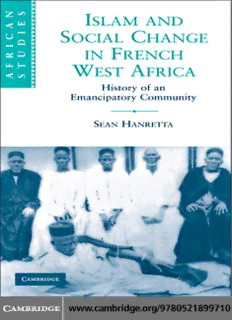
Islam and Social Change in French West Africa: History of an Emancipatory Community (African Studies) PDF
Preview Islam and Social Change in French West Africa: History of an Emancipatory Community (African Studies)
This page intentionally left blank islam and social change in french west africa history of an emancipatory community ExploringthehistoryandreligiouscommunityofagroupofMuslimSufimystics who came largely from socially marginal backgrounds in colonial French West Africa,thisstudyshowstherelationshipbetweenreligious,social,andeconomic changeintheregion.Ithighlightstherolethatintellectuals–includingnotonly elite men, but also women, slaves, and the poor – played in shaping social and cultural change and illuminates the specific religious ideas on which Muslims drew and the political contexts that gave their efforts meaning. In contrast to depictions that emphasize the importance of international networks and anti- modern reaction in twentieth-century Islamic reform, this book claims that, in WestAfrica,suchmovementsweredrivenbylocalforcesandconstitutedonlythe mostrecentroundinasetofcenturies-olddebatesaboutthebestwayforpious people to confront social injustice. It argues that traditional historical methods prevent an appreciation of Muslim intellectual history in Africa by misunder- standing the nature of information gathering during colonial rule and miscon- struingthe relationship between documents andoralhistory. SeanHanrettaiscurrentlyAssistantProfessorofHistoryatStanfordUniversity. HereceivedaB.A.inhistoryfromtheColoradoCollegeandanM.A.andPh.D. in African history from the University of Wisconsin. He has published research onprecolonialZuluhistory,onminingcampsintheBelgianCongo,andonthe historyofIslaminWestAfrica.HisworkhasappearedintheJournalofAfrican History and Comparative Studies in Society and History. His current research focuses onwedding andfuneral reform efforts among Muslims inGhana. african studies TheAfricanStudiesSeries,foundedin1968,isaprestigiousseriesofmonographs, general surveys, and textbooks on Africa covering history, political science, anthropology, economics, and ecological and environmental issues. The series seeks topublish workbysenior scholars as well as thebest newresearch. editorial board DavidAnderson, University of Oxford Catherine Boone, University of TexasatAustin Carolyn Brown, Rutgers University Christopher Clapham, University of Cambridge Michael Gomez, NewYork University Nancy J.Jacobs, Brown University Richard Roberts, Stanford University DavidRobinson, MichiganStateUniversity Leonardo A.Villalo´n,University of Florida Alistof books in this series willbe found attheend of this volume. Islam and Social Change in French West Africa history of an emancipatory community sean hanretta Stanford University CAMBRIDGE UNIVERSITY PRESS Cambridge, New York, Melbourne, Madrid, Cape Town, Singapore, São Paulo Cambridge University Press The Edinburgh Building, Cambridge CB2 8RU, UK Published in the United States of America by Cambridge University Press, New York www.cambridge.org Information on this title: www.cambridge.org/9780521899710 © Sean Hanretta 2009 This publication is in copyright. Subject to statutory exception and to the provision of relevant collective licensing agreements, no reproduction of any part may take place without the written permission of Cambridge University Press. First published in print format 2009 ISBN-13 978-0-511-51789-1 eBook (NetLibrary) ISBN-13 978-0-521-89971-0 hardback Cambridge University Press has no responsibility for the persistence or accuracy of urls for external or third-party internet websites referred to in this publication, and does not guarantee that any content on such websites is, or will remain, accurate or appropriate. Contents List of maps and figures page ix Acknowledgments xi Note on orthographic conventions xiii Abbreviations used in references xv Introduction 1 Implicit knowledge and the colonial episode 4 Traditions, repertoires, and sources 11 Structure of the argument 22 Part One: ‘‘The Suffering of Our Father’’: Story and Context 1. Sufism and Status in the Western Sudan 29 The Western Sudanic tradition 32 The Middle Senegal Valley: colonial intervention and the reconfiguration of authority 45 Conclusions 59 2. Making a Revival: Yacouba Sylla and His Followers 60 Kae´di, Nioro, and the light of a new reform 62 Yacouba Sylla 71 Revival 74 Conclusions 82 3. Making a Community: The ‘‘Yacoubists’’ from 1930 to 2001 83 A prison community 83 Fodie Sylla and the end of militancy 89 Consolidating the community 93 Return to activism 99 From history to myth 110 Conclusions 116 vii viii Contents Part Two: ‘‘I Will Prove to You That What I Say Is True’’: Knowledge and Colonial Rule 4. Ghosts and the Grain of the Archives 121 The grain of the archives: Islam, knowledge, and control 126 Ghostwriters in the archives: religious competition and borrowed knowledge in the colonial library 138 Myths of Yacouba, myths of empire 151 5. History in the Zaˆwiya: Redemptive Traditions 159 Synecdoche and Sufism: Yacouba Sylla, tilmˆıdh shaykh hamahu’llaˆh 162 A community of suffering 171 God’s work: the zaˆwiya, the plantation, and the nation 179 Conclusions 182 Part Three: ‘‘What Did He Give You?’’: Interpretation 6. Lost Origins: Women and Spiritual Equality 189 Women as participants 191 Mahr, adulthood, and honor 195 The vision of Fatima 200 Struggles for control 204 7. The Spiritual Economy of Emancipation 208 Defining slavery and abolition 210 Paths to personhood 217 Conclusions 224 8. The Gift of Work: Devotion, Hierarchy, and Labor 227 Work’s gifts 228 The gift of history 240 Conclusions 249 9. ‘‘To Never Shed Blood’’: Yacouba, Houphoue¨t, and Coˆte d’Ivoire 253 Defining free labor 256 Giving and moral tutelage 260 Moral geography 269 Conclusions 275 Gifts of the Past 275 Glossary 289 Note on References 293 Index 295 Books in This Series 307
Description: